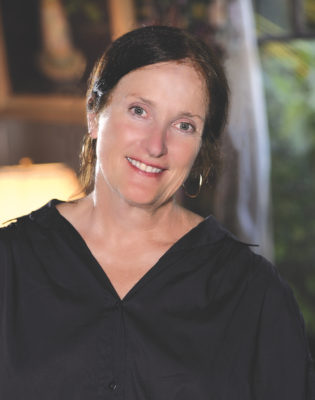Local photographer turned community advocate on homelessness

ALLISON SCHALLERT
Allison Schallert is a woman on a mission to curb homelessness in Los Angeles.
The citizen activist was born and raised in Illinois, studied at DePaul University in Chicago, and spent time in Toronto and New York City before relocating to Los Angeles in 1991.
“What brought you to Los Angeles?” I ask. “No reason,” says Schallert. Adding: “Anything that’s not bolted down tilts toward Los Angeles,” she says with a smile.
As a long-time event photographer, Schallert has worked professionally with entertainment executives and a prominent Democrat presidential candidate, among many others.
Soon after landing in the City of Angels, Schallert met her husband, Brendan, and the couple welcomed two daughters, Maeve and Siobhan. By chance, the family set up home in a 1911 Craftsman in the Oakwood / Maplewood / St. Andrews neighborhood, located north of Beverly Boulevard and between the Larchmont Village neighborhood and Western Avenue. And today, Schallert has mostly praise for the area.
“I think my quality of life went up when we moved to this neighborhood,” she says. “I certainly began to enjoy Los Angeles a lot better living in this area. I love it.”
One thing that does concern Schallert is the homelessness problem that seems only to be getting worse across the city. “It’s out of control,” says Schallert. But her words aren’t empty, and she doesn’t lack sympathy — she is on a mission. In fact, the afternoon that I met her at her home for this piece, Schallert is working on the final details of an event in two days. “Sorry, I’m really busy today. Let’s make this fast,” she tells me as I arrive.
The July 18 event was the latest speaker series hosted by Stories from the Frontline, organized by Schallert and Marilyn Wells in partnership with the John and Marilyn Wells Family Foundation.
The idea behind the Stories from the Frontline speaker series is to help people understand what it’s like to be homeless by inviting some who have overcome homelessness to stand up and share their stories. They are stories of endurance and strength that empower the audience to want to make a difference.
“We provide food and drinks, put up images of what supportive housing looks like, then we give them a storytelling — it’s like theater,” explains Schallert. “After the program, we have experts on-hand to engage with the audience and to talk about what can be done locally.”
The first speaker series, in February 2018, was hosted at The Ebell. Since then, Schallert and Wells have been expanding their advocacy. From attending neighborhood council meetings to volunteering at local nonprofits to advocating for the development of supportive housing, Schallert and Wells are attacking from all sides.
“Because we are ‘Ladies of Larchmont’ we are trying to find ways to support the mayor and find ways to support City Council — we are looking for ways in the system to make change, but also we are there to say: ‘You need to do more,’” says Schallert.
And according to Schallert, she and Wells make an excellent duo. The two have known each other for decades (their kids attended the same preschool, All Children Great and Small). “I’m a taskmaster, and she is the butterfly that floats around from idea to idea, and I try to make those ideas happen,” says Schallert.
Among some of their early successes, Schallert says that their team has helped to get supportive housing approved in nearby Koreatown.
“The few people that were protesting supportive housing in Koreatown were really loud and noisy. What we did was to empower the neighborhood council to use the right language to talk about bridge housing and affordable housing, and how to challenge developers. In the end, all of these community groups came out in support to say that they want this in their neighborhood.”
A major cause of the homelessness crisis, according to Schallert, is that everything is too expensive: “The problem is an affordability crisis, not a lack of housing crisis. People need money to make ends meet.”
That’s why Schallert and Wells now have a project in their sights to encourage homeowners with extra space — ideally those with backyard ADUs (Accessory Dwelling Units) — to take in approved candidates within a local program, who are waiting for supportive housing.
“A lot of my friends have an Airbnb in their backyard and it’s been a way for them to make extra money. But what they need to do — and what would really help the city — would be to host someone who is on the waiting list for supportive housing. The homeowner still makes money, and an approved candidate is off the streets.
“If we can get our neighbors to start to do things like this, we can make a difference.”
Category: People


